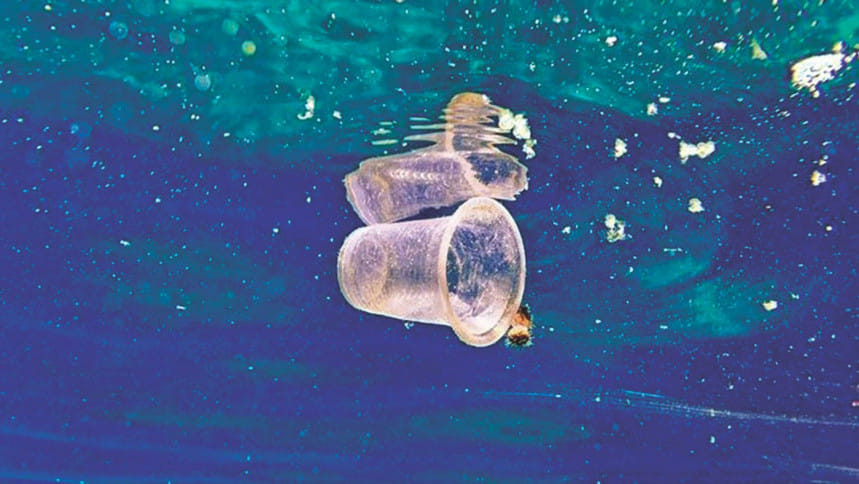The rise in plastic pollution during Covid-19 crisis

Ever since the pandemic began this year, countries across the globe have been striving to protect their people from the virus through various preventive measures where protective gear also known as PPE are in high demand. On the contrary, this has dramatically increased the unsustainable use of plastic posing significant risk for the environment. Personal Protective Equipment (PPE) which includes masks, gloves and goggles have become indispensable plastic products for everyone currently witnessing the coronavirus pandemic. The global health crisis has given rise to the consumption of PPE at a staggering rate, which is considered a shield for combatting the virus. PPE is playing a key role in protecting people, especially the frontline workers, who are fighting day and night to cure millions of patients ever since the outbreak started. This has led to some tough questions for those of us who are continually advocating for environmental protection and sustainability— how are we going to manage the devastating impact of plastic waste generated due to Covid-19?
The worldwide lockdown during the pandemic initially led to positive change to the environment. Reduction in air travel and road transport brought significant drop in the daily CO2 emission level across the globe. However, an unsurmountable challenge has emerged as countries are stockpiling plastic products such as PPEs to prevent the spread of Covid-19 virus. Growing number of households have also been seen to hoard groceries which too come in single-use plastic packaging. According to the World Health Organisation, it is estimated that 89 million medical masks are needed globally every month while the coronavirus pandemic lasts, together with 76 million examination gloves and 1.6 million goggles and face visors. An article in The Economist says that consumption of single-use plastic may have grown by 250-300 percent in the United States alone. A research report has forecasted a spike in the global disposable-mask market from an estimation of USD 800 million in 2019 to USD 166 billion in 2020. A crash in oil price has made it easier for industries to produce more plastic as petroleum, one of the main constituent of plastic composition, has become extremely affordable.
Ever since the outbreak of coronavirus, billions of gloves and protective masks are being disposed every day at a global scale. According to a report published by Environment and Social Development Organisation (ESDO), Bangladesh alone has generated around 14,500 tonnes of PPE and other hazardous plastic waste in March 2020. In order to curb the spread, healthcare workers are mandated to wear PPE and government has ordered people to wear a mask every time they go in public spaces. Few opted for masks made out of fabric, but its effectiveness remains highly questionable. As the consumption of these plastic products have become an everyday norm for us, uncontrolled disposal of these items is severely impacting the environment. Hazardous PPE wastes are piling up in landfills, seabeds and oceans, further adding to the existing plastic pollution and threatening the marine ecosystem. Used PPEs, especially medical waste from hospitals, are also creating health hazard for waste pickers who are responsible for collecting and transporting the waste to the storages. The lockdown period has given rise to online shopping and food delivery where most items come in unrecyclable plastic packaging, an inevitable choice people are making at this point.
Scientists have been warning us about the impacts of plastic pollution for decades. Globally the production of plastic has quadrupled over the years and the scientific community is worried that if this growth continues, the entire plastic production will make up to 15 percent of total global emission by 2050. Plastic waste is considered one of the greatest environmental challenges that can have devastating impact on land, wildlife, oceans and human health. Ironically, the issue of plastic pollution has taken a back seat during the pandemic. What we are using now to fight the global public health crisis, is contributing to a bigger crisis. The year 2020 was noted to be the year for climate and environment action, where countries are said to be gearing up to take a comprehensive and coordinated effort in addressing climate change. Adopting circular economy was considered a catalyst for accelerating implementation of the global agenda 2030 and became a key interest of focus for government, development agencies and corporations. Number of industries had started recycling initiatives to show their commitment in protecting the planet. However, due to the economic downturn caused by the pandemic, government and corporations are finding it hard to live up to their commitment of sustainable practices, as it has become critical for both parties to revive the economy at any cost. Ecological sustainability is being given the least priority as countries are racing to revive their economy. Many recycling businesses have been reported to close down because of fear of contracting the virus from plastic waste, lack of staff member and high overhead cost.
The global pandemic has highlighted crucial gaps in our structural system among which plastic pollution has lingered for ages. Managing this unprecedented level of plastic waste will be a challenge for countries, especially developing nations like Bangladesh who has poor, unregulated waste management system that can further trigger health risk for workers from informal sector. The current pandemic situation has made it difficult for us to make a conscious choice due to not having an alternative solution. What we require is to make informed planning at different level and timescale. During the recovery period it's imperative that government consider ecological sustainability as a key priority in disaster preparedness. This also means investment in efficient waste management system and allocating resource for research and development. We must look into a post-pandemic recovery through the lens of environmental sustainability and resilience, where green initiatives are integrated within the economic stimulus package to create a win-win situation for both economic revival and sustainable development of the country. Most importantly, a shift in behaviour is needed where every citizen makes conscious choice of avoiding the use of unrecyclable plastic products in everyday life to protect the environment.
The current crisis requires urgent government action to prevent long term environmental risk and health hazards. At this point it is critical that the government, along with experts and development actors, establish a practical guideline on the usage and disposal of PPE for medical facilities, factories, malls, shops and local bazaars. A strict monitoring mechanism and law enforcement engaging the local authorities are required to ensure that guidelines are been implemented at every facility. Media can play a crucial role in disseminating the guideline and creating public awareness. This can also become an employment opportunity for young people to engage in monitoring process of waste disposal at community level. It is important to ensure health and safety of workers involved in waste management where they are provided with PPE to protect themselves from virus-related hazards. While a number of medical facilities are burning the used PPEs, its critical to ensure that these activities do not cause air borne hazards. Finally, we strongly urge for a specially trained taskforce to oversee nationwide management of Covid-19 related waste to prevent further degradation of the environment.
Farah Kabir is the Country Director of ActionAid Bangladesh, Anhara Rabbani is the Resilience and Environmental Sustainability Officer of ActionAid Bangladesh.

 For all latest news, follow The Daily Star's Google News channel.
For all latest news, follow The Daily Star's Google News channel. 



Comments